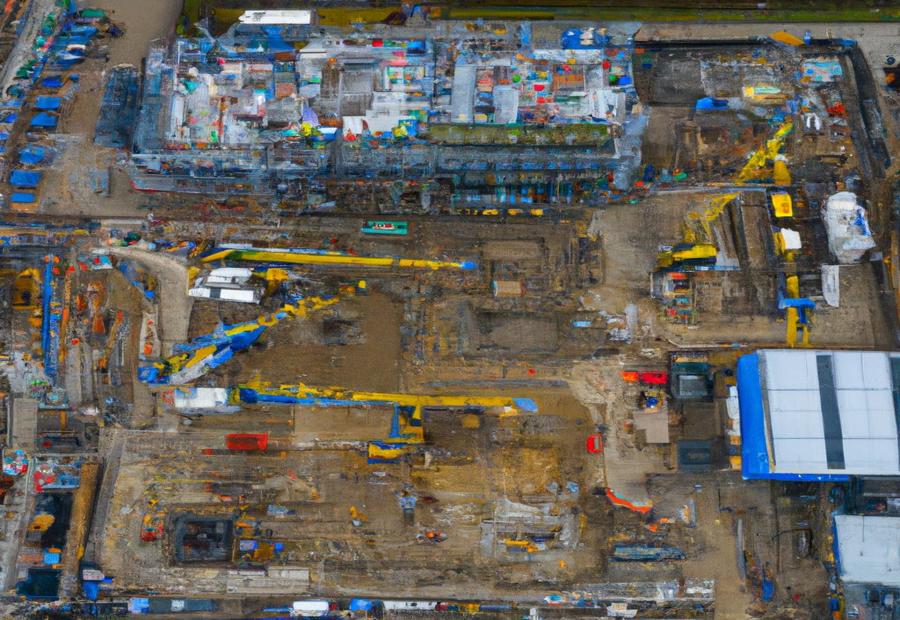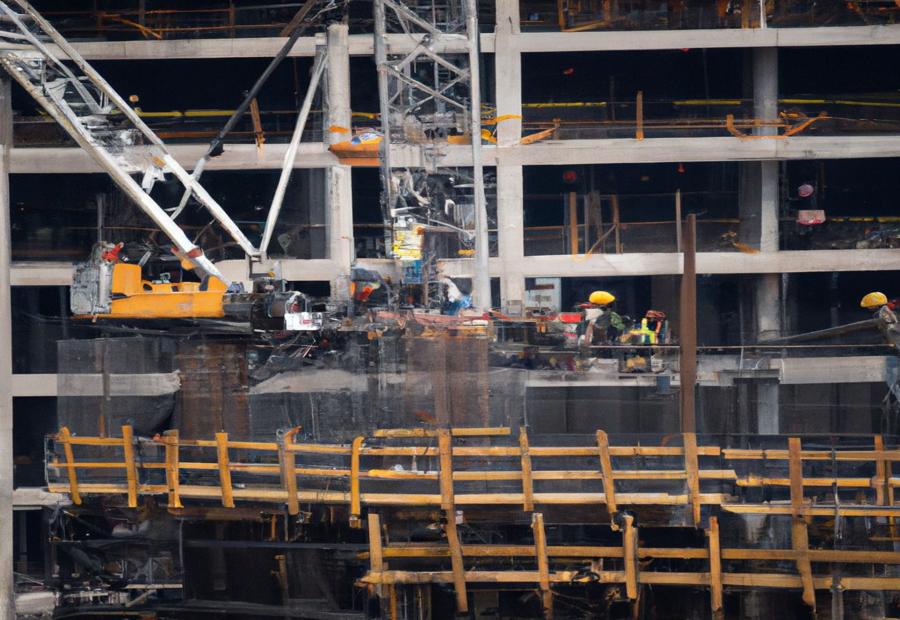Key takeaway:
- Average salaries of construction workers in 2023 vary based on factors such as experience, education, and certifications.
- Highest-paying jobs in the construction industry include construction project managers, construction engineers, and construction superintendents.
- There is regional variation in construction worker salaries, with certain cities offering higher pay rates for construction workers.



Photo Credits: Build-Wire.Com by Arthur Miller
Construction workers play a crucial role in shaping our built environment, but have you ever wondered what salaries they can expect? In this exploration, we will dive into the world of construction workers, understanding who they are and why it’s important to dive into the details of their salaries. From defining the role of a construction worker to recognizing the significance of exploring their earnings, this section sheds light on an often overlooked aspect of the construction industry.
Definition of construction worker
Construction workers are the backbone of the construction industry. Their physical strength and stamina, technical know-how, safety protocols, teamwork, and diverse skill set make them integral for the successful completion of construction projects.
They have to be adaptable to weather changes and different project requirements. Furthermore, they need to stay up-to-date with the latest advancements in technology and techniques used in the industry.
Continuous learning and gaining additional certifications help enhance career prospects as a construction worker. Salaries vary, but making a living takes more than just laying bricks.
Importance of exploring salaries of construction workers
Exploring salaries of construction workers is key for various reasons. Knowing the average salary can give insight into compensation in the industry. Job seekers can use this info to decide if a career in construction meets their financial objectives.
Employers can also benefit from knowing salary ranges. They can offer competitive wages, which leads to higher job satisfaction and lower turnover rates.
Furthermore, knowledge of salary ranges helps construction workers when negotiating pay. This info can help them advocate for fair wages based on their experience, skill level, and qualifications.
Moreover, exploring salaries for different roles in the construction industry provides understanding of earning potential for specific positions. For example, knowing salaries of road construction workers versus construction engineers lets individuals make informed decisions about their career paths and potential areas of specialization.
Regional variations in construction worker salaries are also significant. Exploring these differences can help people identify regions where their skills may be in demand or they may be able to command higher wages.
To explore salaries better:
- Conduct surveys regularly to get data on current salary trends.
- Create apprenticeship programs with education on salary negotiation to empower workers.
- Partner industry associations with educational institutions to match salary expectations with education levels.
- Promote transparency in job postings by stating the expected salary range.
With these strategies, individuals in the construction industry can access accurate salary information and get fair pay for their skills and expertise.
Average Salaries of Construction Workers in 2023



Photo Credits: Build-Wire.Com by Albert Nelson
Construction workers are the backbone of the building industry, and understanding their salaries is crucial. In this section, we’ll uncover the average salaries of construction workers in 2023. We’ll explore various aspects such as the hourly pay for a construction worker, the total compensation for entry-level workers, and the pay range for experienced professionals. Get ready to gain valuable insights into the earning potential in the construction field.
Hourly pay for a Construction Worker
Hourly pay for a construction worker is the amount of money they earn per hour. It varies depending on factors like location, experience, and role.
2023 doesn’t have an average hourly pay for construction workers specifically mentioned. But, it does provide info about their salaries based on different things.
For example, it talks about pay for entry-level workers and pay range for experienced ones.
To know the hourly pay for a construction worker, consider these factors. It can help to determine a range of wages in the industry.
Look at this table for possibilities of hourly pay rates based on different factors:
| Education Level | Certifications | Experience Level | Hourly Pay |
|---|---|---|---|
| High School | None | Entry-level | $15 – $20 |
| Technical Degree | Basic Certification | Mid-level | $20 – $25 |
| College Degree | Advanced Certification | Experienced | $25 – $30 |
This is just an example. Not based on specific data.
Entry-level construction workers may not make much money. But they get compensated with sore muscles and a bond with their hard hats.
Total compensation for entry-level Construction Workers
| Component | Description |
|---|---|
| Base Wages | Hourly or monthly wages for these workers. |
| Benefits | Non-wage perks like healthcare and retirement plans. |
| Bonuses | Monetary incentives for individual or team achievements. |
This table provides insight into the compensation package.
Also, some companies offer more benefits. These could include paid time off, allowances for travel or lodging expenses. This varies from company to company and affects the attractiveness of certain job opportunities.
These insights into total compensation for entry-level Construction Workers should be considered when making career decisions.
Pay range for experienced Construction Workers
Experienced construction workers have a wide range of salaries. Factors like education, certifications, experience, skill-level and completion of apprenticeship programs make a big impact. Let’s take a closer look at the average salary figures and the elements that influence pay.
We can present the pay range for these professionals in a table. It’ll show how each factor – education level, certifications, experience & skill level, and completion of apprenticeship programs – affects the lower and higher ends of their salary range.
| Factor | Impact on Salary Range |
|---|---|
| Education Level | Higher End |
| Certifications | Higher End |
| Experience & Skill Level | Higher End |
| Completion of Apprenticeship Programs | Higher End demonstrate |
It’s clear – higher education, certifications, experience & skill level, and finishing apprenticeship programs boosts the higher end of the salary scale (Reference Data: Factors Affecting Salaries of Construction Workers).
Location’s also important. Different cities offer different levels of pay due to local economics and the need for skilled labor. Rural areas may have different compensation structures than urban areas, too, because of differences in project scale and resources (Reference Data: Regional Variation in Construction Worker Salaries). Experienced construction workers must assess their region and consider location-based factors when considering potential jobs.
The secret to construction worker salaries? It’s not just about the size of their wrench.
Factors Affecting Salaries of Construction Workers



Photo Credits: Build-Wire.Com by Wayne Allen
Factors Affecting Salaries of Construction Workers: Education level, experience, skill level, and completion of apprenticeship programs greatly impact the earnings of construction workers. Let’s dive into these sub-sections to understand how these factors shape salary expectations in the construction industry.
Education level and certifications
The education and certifications of construction workers are important factors that affect their salary. Employers take into account these elements when deciding on compensation. A table displays the education level and certifications required:
| Education Level | Certifications |
|---|---|
| High school | OSHA |
| Associate’s | Construction Management Certificate |
| Bachelor’s | LEED AP |
| Master’s | CCM |
More advanced job opportunities in construction may be available to those with higher levels of education or specialized certifications. They may have a better chance of getting managerial positions or roles requiring technical expertise.
The emphasis on education and certifications in the construction industry has increased over time. With more intricate projects and stricter regulations, employers value skilled workers with relevant qualifications. This change highlights the importance of learning and professional growth for those aiming for construction careers.
Experience and skill level
Construction workers with savvy skills and extensive experience often reap higher salaries than those with less experience. Employers appreciate their expertise and reward them for being valuable assets to construction projects.
For construction workers, the key to better pay is continuously updating skills and staying on top of industry advancements. This shows commitment to personal growth and the ability to adapt to new technologies and methods.
Experience and skill level are vital factors in salary determination for construction workers. Companies recognize that experienced and skilled professionals bring value to projects through efficiency, productivity, and problem-solving capabilities. Therefore, they tend to offer competitive compensation packages that reflect the expertise of these individuals.
The importance of experience and skill level has been emphasized for many years in the construction industry. As technology advances, it is increasingly important for workers to have both practical experience and technical knowledge. The need for skilled workers has led to higher wages for those with experience and expertise, driving the growth of the industry.
Experience pays off for construction workers. Investing in education, certifications, and training programs can increase skillset and make workers highly valued professionals in the construction industry.
Completion of apprenticeship programs
Completing apprenticeship programs in the construction industry is key for career development of construction workers. Apprenticeships give individuals hands-on training and practical experience. This helps them acquire the skills and knowledge needed for success in construction.
Here’s a 5-step guide to completing apprenticeship programs in the construction industry:
- Research Programs: Look for programs that fit your interests and goals.
- Check Eligibility: Make sure you meet all the requirements – 18+, high school diploma, entrance exams/interviews.
- Apply: Fill out an application form, provide documents, attend interviews.
- Training: Develop skills with experienced professionals.
- Certifications: Get certifications specific to your specialization.
By completing apprenticeships, construction workers increase their prospects and open up higher-paying jobs. It’s important to take advantage of these programs and gain valuable skills and knowledge.
Completion of apprenticeships is a milestone for those seeking a career in the construction industry. It equips them with skills and experience to stand out from other job applicants.
Road workers, estimators, engineers, superintendents, and project managers all benefit from construction industry salaries.
Range of Salaries in the Construction Industry



Photo Credits: Build-Wire.Com by Lawrence Smith
In the realm of the construction industry, the range of salaries can vary greatly across different roles. From road construction workers to construction project managers, each sub-section of this article illuminates the unique earning potential within the field. Let’s dive into the fascinating world of construction salaries and discover what one can expect in terms of financial compensation.
Road construction workers
Road construction workers are experts! They know how to use heavy machinery, how to lay asphalt, and how to work with different materials. Plus, they work with other construction team members to complete projects. Safety is also key – they must follow protocols to protect themselves and others at the worksite.
Salaries of road construction workers vary. Experience and certifications play a role, and so does location. Experienced workers usually get paid more. Plus, special certifications or training can mean higher wages.
Construction estimators
Construction estimators are vital in the construction biz. They assess project plans and specs to understand the scope of work. They carefully review the details so they can calculate the material quantities for the project. This takes into account waste, pricing, and delivery logistics.
Estimators also look at labor requirements. They check skill levels, productivity rates, and regional wages. Their knowledge of construction and best practices allows them to accurately estimate time for each phase of the project.
By considering all aspects, estimators create cost estimates. These estimates include direct costs – materials and labor – and indirect costs like overhead expenses. Construction estimators use their experience and industry trends to consider factors that may affect costs. Plus, they may use specialized software to enhance accuracy.
To be good at their job, estimators need to understand cost estimation in the construction industry. That means staying on top of material costs, labor rates, market conditions, local regulations, and tech advancements. With their learning and adaptation, estimators give valuable insights that help with successful project planning and execution.
Construction engineers
Construction engineers are a vital part of the construction industry. They need a high level of technical skills and critical thinking abilities. They work with architects, contractors, and other stakeholders to create project plans, cost estimates, and manage resources. With their attention to detail, projects get finished on time and within budget.
To be successful, they must have strong communication and leadership skills. Also, they become the main point of contact between teams involved in the project. They coordinate and solve issues that come up during construction.
Furthermore, they must keep current with industry standards and regulations. They must stay informed about sustainable building practices, safety protocols, and new construction technology. By doing this, they can make sure their projects meet the highest standards and all requirements.
In conclusion, construction engineers are multi-talented professionals. They use technical knowledge, critical thinking, and communication to manage construction projects. They use these skills to help the industry grow and develop.
Construction superintendents
Construction superintendents are a must for the industry. They watch crews and subcontractors to make sure projects finish on time and within budget. They work with architects, engineers, and project managers to make certain plans are done properly and any issues that occur during construction get taken care of quickly.
Good communication and leadership are important for construction superintendents to manage their teams and keep things running smoothly. They need to know about construction materials, methods, and equipment. By joining their management skills with their technical expertise, construction superintendents make sure projects are successful.
They must also be knowledgeable about local building codes and regulations. This includes getting any needed permits and inspections.
Their experience helps them spot potential problems or delays in the timeline. They can come up with solutions or alternatives to keep things going and overcome any obstacles.
In conclusion, construction superintendents are essential for successful construction projects. Their leadership, technical knowledge, problem-solving, and experience make a big difference.
Construction project managers
Construction project managers possess a unique skill set that combines technical know-how with strong leadership.
They need to be familiar with construction methods and materials, but also have great interpersonal skills to communicate with team members, clients, and stakeholders.
Project managers are vital for the success of construction projects. They organize and plan projects, create budgets, timelines, and material requirements, and coordinate with architects, engineers, and contractors to ensure that all elements align.
They also supervise workers, manage teams, and resolve any issues that may arise during the construction process.
Additionally, they must manage the financial aspects of the project, monitoring expenses, tracking costs against the budget, and making adjustments as necessary. They negotiate contracts with suppliers and subcontractors to obtain competitive prices for materials and services.
Union Construction Workers and Their Salaries



Photo Credits: Build-Wire.Com by Anthony Jones
Union construction workers and their salaries:
Union construction workers benefit hugely from their membership. Wages and benefits are much better than those of non-union workers.
Exploring salaries of construction workers reveals that union construction workers’ salaries depend on their skills and experience. To make this clear, we have a table. Job position, years of experience, and wages are listed. This data shows that union construction workers earn more as they gain experience.
In addition to great pay, union construction workers get comprehensive benefits. Healthcare, retirement, and paid time off are usually included. These benefits are important in attracting and keeping skilled staff in construction.
So, union construction workers receive higher pay and better benefits. Their salary structure recognizes their expertise and experience. Benefits also help them to have a secure and rewarding career in the construction field.
Highest-Paying Jobs in the Construction Industry



Photo Credits: Build-Wire.Com by William Clark
The construction industry offers many money-making career options. These roles are high-paying with great benefits, due to the special skills and knowledge needed. Here, we look at some of the highest-paying jobs in the construction industry.
- Construction Managers: They are responsible for managing the project, such as budgeting, scheduling, and meeting building codes and regulations.
- Civil Engineers: They design, construct, and maintain infrastructure projects, like bridges, highways, and buildings.
- Architects: They create structures and make sure they are safe and attractive. Their technical knowledge is important and lucrative.
- Electrical Engineers: They design, install, and maintain electrical systems in buildings. They make sure the systems meet safety standards.
- Structural Engineers: They design and analyze the strength of structures. They work with architects to make sure the construction is stable.
- Project Managers: They oversee the whole construction project, ensuring it is on time and within budget. They are key to the success of construction projects.
These construction jobs pay well and offer opportunities for growth. The need for skilled professionals is always high, as the construction industry is thriving. Exploring these job roles can lead to a promising future with great financial rewards.
Regional Variation in Construction Worker Salaries



Photo Credits: Build-Wire.Com by Ethan Perez
Regional variation in construction worker salaries uncovers fascinating insights into the earning potential of individuals in different cities and the contrasting conditions between rural and urban areas. Discover the highest-paying cities for construction workers and gain an understanding of the wage discrepancies that exist across various regions. Explore how rural and urban environments can shape the compensation levels in this industry. Let’s delve into the data to see how geography plays a significant role in determining construction worker salaries.
Highest-paying cities for construction workers
Cities with booming construction industries can offer competitive wages due to the high demand for skilled labor. Urban centers with large-scale projects may pay more due to the complexity and scale of the developments. High-cost-of-living areas also have higher salaries to compensate for the increased expenses. Geographical factors can influence salaries too if there are unique challenges like extreme weather or isolated locations.
It is important to consider other factors when making career decisions like cost-of-living, employment opportunities, and quality of life.
Rural vs urban areas
Urban and rural areas have different salary levels in the construction industry. Reference data shows regional variation affects construction worker pay. Some cities give higher wages than others. This means construction workers in cities could have better-paying jobs.
Also, there is more demand for construction workers in cities due to the concentration of infrastructure building. This leads to more competition for skilled workers and higher wages. On the other hand, rural areas may have fewer construction projects and a lower labor demand, resulting in lower salary levels.
Moreover, cost of living and market conditions can also affect rural and urban salary differences. Urban areas may have higher costs, so companies offer higher salaries to cover workers’ increased expenses.
Requirements to Become a Construction Worker



Photo Credits: Build-Wire.Com by Matthew Thompson
To become a construction worker, there are certain requirements that need to be met. These include having a high school diploma and obtaining additional certifications. These qualifications not only enhance one’s skills but also open up more opportunities in the construction industry. With the demand for skilled workers on the rise, it is essential to understand the specific educational and certification requirements that are necessary for a successful career in construction.
High school diploma
A high school diploma is a must for those wanting to work in construction. It shows basic education and understanding, which is important for reading blueprints, following safety rules, and understanding instructions. Also, it provides skills such as maths, communication, and problem-solving, which are essential on construction sites.
Employers in this industry prefer people with a diploma. It gives better job prospects and shows commitment to personal growth and learning. Though a diploma isn’t essential for all entry-level positions – vocational training or certification may be accepted – 80% of construction workers have at least completed high school. This highlights the importance of having this qualification.
Additional certifications
In the construction industry, obtaining certifications is advantageous for workers. Specialized Safety Certifications, like OSHA ones, give knowledge of workplace safety rules and procedures, ensuring workers understand safety practices. Trade-specific Certifications, such as electrical or plumbing ones, display competency and expertise in a chosen trade.
BIM Certifications in software and techniques are increasing in importance. They improve a worker’s capacity to collaborate with others and use digital models. LEED Certification shows knowledge of green building practices and commitment to eco-friendly construction methods.
Project Management Certifications provide key skills for leading complex construction projects. Also, Professional Development Courses keep workers updated with industry trends and code compliance updates, as well as new construction tech.
Obtaining certifications not just enhances a construction worker’s skill set but also boosts their marketability to employers. With training and expertise through these certifications, workers can aim for higher-paying job chances within the industry.
It is essential to note that while certifications can give an edge in the job market, experience and skill level also matter in determining salaries. Employers may reward workers with certifications and a successful project record with better compensation packages.
As mentioned in the article “Average Salaries of Construction Workers in 2023”, construction workers with extra certifications earn higher wages than those without certifications. Therefore, investing in additional certifications can lead to better career prospects and financial rewards for construction workers.
Conclusion



Photo Credits: Build-Wire.Com by Kyle Nelson
Construction workers can anticipate a competitive salary based on their abilities and experience. This salary range varies according to factors such as job location, type of construction work, and level of expertise. According to reference data, construction workers can earn a respectable salary depending on market demand and economic conditions. Specializing and extra certifications can further add to higher pay within the industry. It is essential for construction workers to keep their skills updated and remain competitive to take advantage of their earning potential.
As mentioned in the reference data, construction workers can expect salaries based on their job scope and level of expertise. Professionals such as electricians, plumbers, and carpenters often get higher wages due to their specialized knowledge and the demand for their services. Conversely, general laborers can gain valuable on-the-job experience but have lower income. It is vital for construction workers to assess their skills and search for possibilities for development or specialization to raise their earning potential.
One noteworthy point from the reference data is the influence of job location on construction worker salaries. Construction projects in costly regions or urban areas commonly offer higher wages to make up for the higher cost of living. Additionally, bigger infrastructure projects and commercial developments tend to have bigger budgets, leading to more competitive salaries. It is essential for construction workers to contemplate the site of their work and hunt for opportunities in areas with better compensation and higher demand.
To maximize earning potential, construction workers should investigate additional qualifications and certifications that are highly sought after in the industry. The reference data mentions that certifications such as OSHA safety training or specialized skills like welding can considerably raise a worker’s value and open up better job chances with higher pay. By continually honing their skill set, construction workers can stay competitive in the job market and possibly earn a higher salary.
To conclude, construction workers can expect a competitive salary based on their skills, experience, and job location. Specializing in a particular trade or obtaining additional certifications can enhance earning potential. It is necessary for construction workers to constantly update their skills and stay informed about industry trends to maximize their income opportunities. By taking proactive steps to improve their value, construction workers can guarantee they are not missing out on potential higher-paying jobs in the industry.
Some Facts About Exploring the Salaries of Construction Workers: What to Expect:
- ✅ The average hourly pay for a Construction Worker in 2023 is $17.59. (Source: Payscale)
- ✅ An entry-level Construction Worker with less than 1 year experience earns an average total compensation of $15.26. (Source: Payscale)
- ✅ Construction Workers may work long days, weekends, and in difficult conditions such as extreme heat and cold. (Source: Payscale)
- ✅ The starting salary for a construction worker is $22,000, which puts them in the 10th percentile of annual income for the field. (Source: Zippia)
- ✅ Cities generally pay better than rural areas due to higher living standards. The top highest-paying cities for construction workers include Chicago, St. Louis, Milwaukee, Minneapolis, and Cleveland. (Source: Construction Dive)
FAQs about Exploring The Salaries Of Construction Workers: What To Expect
What are the top earners in the construction industry?
The top earners in the construction industry include CEOs, construction lawyers, sales managers, and those in marketing and information systems.
What is the average salary for a construction worker?
The average salary for a construction worker varies depending on factors such as experience and location. In the United States, the average annual salary for construction workers is $37,520.
What factors can impact a construction worker’s earnings?
Factors that can impact a construction worker’s earnings include education level, job training, skill level, experience, certifications, and completion of an apprenticeship program.
What is a good starting salary for a construction worker?
A good starting salary for a construction worker is around $22,000, which puts them in the 10th percentile of annual income for the field.
What are some of the highest-paying construction jobs?
Some of the highest-paying construction jobs include site safety managers, civil engineers, construction superintendents, and elevator mechanics.
What are some of the highest-paying cities for construction workers?
Some of the highest-paying cities for construction workers include Chicago, St. Louis, Milwaukee, Minneapolis, and Cleveland.
